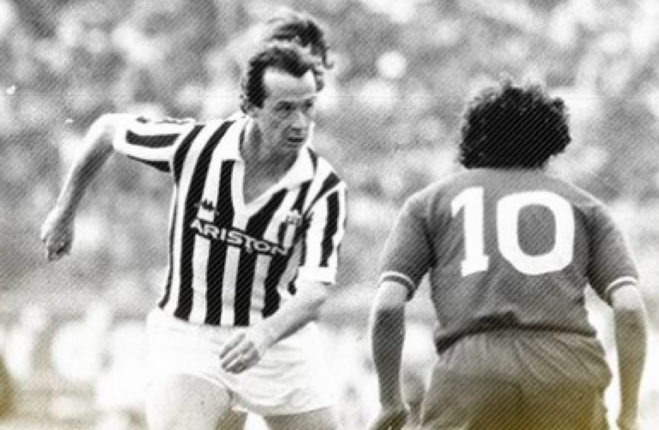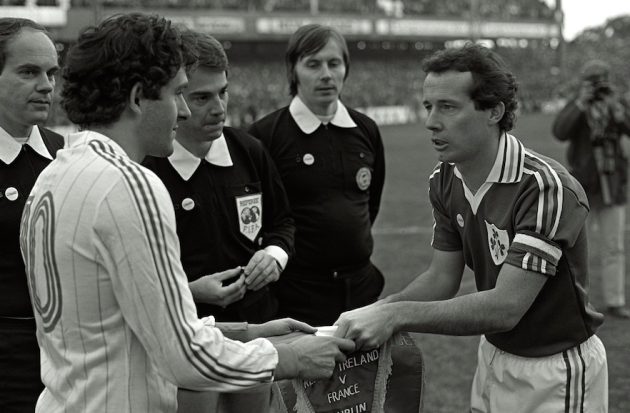MANY YEARS AGO, I sat in an RTE production office as Jimmy Magee regaled me with a story about how, once upon a time, he was on a commentary assignment in Turin.
He touched down at the city’s airport and hailed a taxi. When he hopped in, there was the inevitable small talk. The driver asked where he was from and grew increasingly excited when Magee told him.
“Ireland! Ireland! Ah, Brady, no? Liam Brady?”
Magee told the driver that he was a sports journalist with Ireland’s national broadcaster and that Brady worked for them too.
The driver was stunned. For the rest of the car ride, Magee was painted a vivid picture of what it was like growing up as a Juventus fan in the 1980s. For the entire journey, the driver spoke incessantly about Brady, his remarkable left foot and the penalty in 1982.
When the car pulled up outside Magee’s hotel, he took out his wallet and handed the driver the fare.
“No,” he replied.
“A friend of Liam Brady’s is a friend of mine. And friends don’t pay”.
It was an insight into how revered Brady is in the city, despite only having played there for two years.
His time there, when usually recounted, centres on that remarkable Serie A finale some 35 years ago when Brady – having been informed he would be sold in the summer and be replaced by Michel Platini – stepped up 15 minutes from the end of a must-win game against Catanzaro and scored the decisive penalty.
“I looked over at [Giovanni] Trapattoni on the bench and he just nodded,” he later said.
There seemed a genuine concern Brady would miss on purpose, just to anger the Juve top brass. One final two-fingered salute to the suits who wanted him out.
“They made it out to be this wonderful professional effort on my part not to miss it purposely,” Brady said.
But why compromise an already-imperious legacy? Brady marked his territory early on, a wild departure from the usual well-worn tale of a misfiring import from Britain who struggled with homesickness and learning a new language before eventually returning home.
Going against type, Brady immersed himself in a new culture but didn’t lose himself in the process.
The relentless, legendary Juventus attacker Roberto Bettega tells the story about Brady’s debut in a pre-season friendly.
“Brady did something that was so unusual,” he said.
“When the referee rang the bell for us to assemble in the tunnel, Brady stood up and made a point of personally shaking hands with everyone. We Italians looked at each other. That was his way and it was great.”
The culture of Italian football was every man for himself, as Brady himself told Eamon Dunphy last year.
“I remember some of the players on our team – Gentile, Scirea, Cabrini – they’d say after the game, ‘Well, my man didn’t score’. They would feel that if their man didn’t score, they’d had a great game. They were focused on what they had to do.”
Brady enjoyed a superb debut campaign – something that’s often lost on those recalling his time in Turin.
“I’m remembered at Juventus as the guy who was so professional and all that but I’d like to be remembered for more than that. I played very well in my first year but my career at Juventus seems to centre around this penalty.”
The first year had many highlights.
There was a ferocious low-drive to the bottom corner in the local derby against Torino and there was a majestic individual performance in a clash with Inter, in which Brady scored one and assisted on another. Away to Bologna, he conjured a brace. In a vital game against Perugia, Brady tucked away a penalty to draw Juventus level before Domenico Marocchino grabbed a last-gasp winner. In total, he finished with eight top-flight goals and was Juve’s second-highest scorer. In his first season in Italy, he was a domestic champion.
Within six months, he had a decent steer on the language. Six months after that, he was fluent.
Everything had come together, quite seamlessly.
It was easy, compared to the rough and tumble of English football and how hard it was. Italy was a doddle compared to playing against Liverpool and the likes of Jimmy Case and Tommy Smith. They’d body check you and pull your shirt (in Italy) but you weren’t looking at getting broken up.
I remember talking to John (Giles) before I went and he said, ‘You’ll be alright over there because you can beat a player. And then it’s going to open up for you and they’ll like you there for that’. And that’s what happened.”
While Brady’s second season wasn’t as much of a standout, he continued to contribute in crucial fixtures. There was another winner against Inter and another derby strike against Torino as Juve battled Fiorentina for the title.
And then the news broke three games before the end of the season. At the time, Italian teams were only allowed one non-Italian player. The day before the transfer deadline for foreign signings, whispers grew louder that Juve were about to sign Michel Platini from Saint-Etienne and that Brady would be sold.
“It was devastating for me to be told in that way,” Brady said.
“We’d just won the league and I had another year on my contract. It never entered my mind that they might say, ‘Look, we’re going to replace you’. It was a shock when I found out Platini was going to be signed. But, Gianni Agnelli, the owner, wanted Platini and Giampiero Boniperti – the club president – had to do what he was told.”
Brady’s solitary strike had just won the game for Juve against Inter. His stock had never been higher. But, there was very little he could do.
“Trapattoni was the coach then and I went to see him after training,” he told Dunphy.
“And I asked him and he said, ‘No, no, no’. But I knew he was telling lies. I could see by his face. He was in a difficult position. I went back home after training and I got a call to go into the club and I knew then that I was going to be told. Boniperti, in that typical Italian fashion, said, ‘Brokenhearted but…we’ve made this decision. If we could keep you we would. It’s a ridiculous rule that we can only have one or two foreigners’. So I said, ‘Stick it up your ass’”.
The Juve top brass were concerned that Brady would refuse to play. The Scudetto was on the line and they needed him. But he started the next game against Udinese and Juve won 5-1 away from home.
“I was never not going to play,” Brady said.
“I was only winding them up. I had too much respect for the guys I was playing with.”
Fittingly, the season went to the wire before Brady stepped up and delivered the club yet another championship.
But that hadn’t been the initial plan.
“We decided before the game that because of what had gone on I wasn’t going to take penalties anymore,” he said.
“It was going to be a centre-forward we had at the time – Pietro Virdis. But Trap had substituted him – he was off. So, when we got the penalty, there was a bit of looking around. ‘Who’s going to take it?’ And I said, ‘I’ll take it’. I’ve always taken penalties thinking, ‘I’m going to score this’. I was never nervous taking one. I never didn’t want to take one.”
Brady went on to stay in Italy for five more years and played for Sampdoria and then Inter before a short-lived stint with Ascoli.
But his immense contribution and impact on what was a phenomenal Juventus team during an illustrious period of Italian football should never be understated.
It’s testament enough to his talent that when the best team in the country could only sign one foreign player, they wanted Brady.
It’s testament to his legacy that when you tell a taxi driver in Turin that you’re Irish, chances are you won’t have to pay.
Epilogue
In February 2008, when a manager-less Republic of Ireland took on Brazil in an international friendly at Croke Park, I was sitting in the press box ahead of kick-off and chatting to a Brazilian journalist.
At one point, I excitedly asked him if the debonair gentleman in an immaculate dark-coloured overcoat sitting close by was Falcao, the legendary Brazilian and Roma midfielder and one of the stars of the 1982 World Cup.
My new friend told me it was and that Falcao was in Dublin covering the game for Brazilian television. As I stared, wide-eyed, I noticed Falcao call out to somebody who was walking past the commentary positions. Quickly, he was up and out of his seat and racing towards the aisle.
He hurried down the steps and threw his arms around someone. He came out of the embrace and put both hands on the other person’s shoulders, gripping him tightly.
It was Liam Brady.
The pair, at one stage the two finest foreign players in Serie A, spoke for a few moments, laughing, joking and cajoling. I watched Falcao as he returned to his seat, grinning from ear to ear.
And for a little while I thought of Brady – the man with the dour reputation – whose magic and sorcery on football fields across Italy a different lifetime ago continued to leave so many superstars weak at the knees.
The42 is on Instagram! Tap the button below on your phone to follow us!


